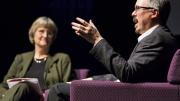A standing-room-only Farkas Hall was packed with nearly 300 rabid Breaking Bad fans on Thursday, anxious to hear the show’s creator and lead writer, Vince Gilligan, explain how he made television magic. But Breaking Bad’s biggest Harvard fan wasn’t in the crowd; she was on stage, sitting next to the star and gushing about how she binged on the show and was floored by the series finale.
Drew Faust, as Harvard president, formally introduced Gilligan to the audience. But she made it clear she was a huge aficionada as well, peppering him with questions that only a dedicated viewer could know. (The conversation with Gilligan, sponsored by the Office for the Arts, is part of a larger series of lectures and discussions aimed at bringing an increased focus on the arts to Harvard.)
For the next 45 minutes, Faust and Gilligan—both native Virginians—watched clips from the show and discussed such topics as the atmosphere inside the Breaking Bad writers’ room, various character arcs and motivations, as well as Gilligan’s penchant for visual storytelling, a method Faust said really made the show stand out in her mind.
“There seems to me a question I have to begin with: Where did the preposterous premise for this show come from?” Faust asked. “How did you ever dream it up? Was it a nightmare?”
Gilligan explained that he was on the phone with a friend who was a fellow writer for the television show The X-Files (where Gilligan was a writer/producer for many years), talking about what they should do next in their careers. “He made a joke that we should buy an RV and put a meth lab in the back of it,” he said, to audience laughter. “As he said that, it was one of those eureka moments. I just knew.”
The evolution of the show, Gilligan said, hinged on shaping the character of Walter White, Breaking Bad’s antihero, brilliantly played by Emmy Award-winning actor Bryan Cranston. Even though many television programs employ a structure that allows them to remain on air as long as possible, Gilligan said he wanted his show to have a finite ending that would allow him to have his characters change in ways not often seen on television. “I wanted to create a TV show in which the main character turns into the protagonist. The reason that excited me was that TV does not do that historically… it’s very exciting to have a show that hinges on character change.”








